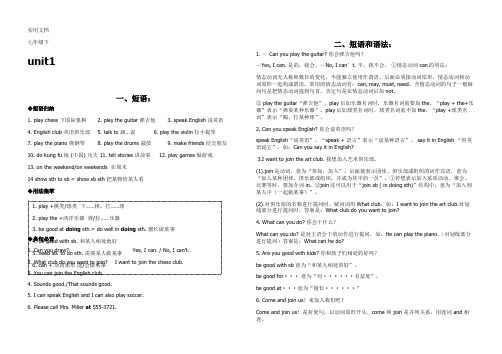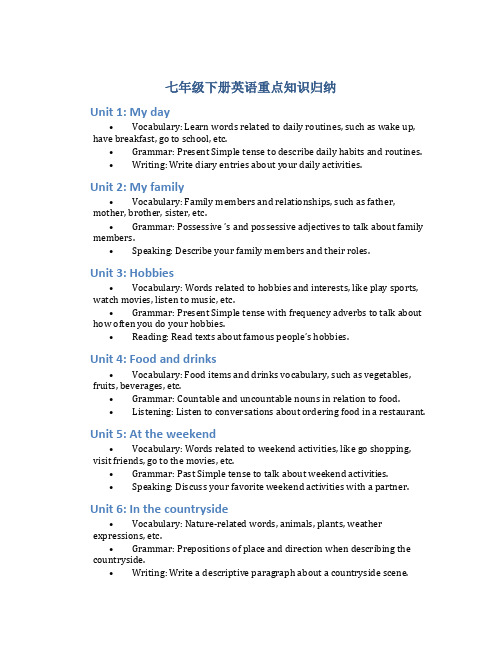七年级下册英语最新知识点归纳总结
七年级下册英语知识点总结归纳

七年级下册英语知识点总结归纳 一、单词拼写 1. 根据中文或英文提示拼写单词。 2. 掌握名词、动词、形容词的词性转换,如:play(名词形式:player)、careful(副词形式:carefully)等。
二、基本语法知识 1. 了解名词的单复数形式及其规则变化。 2. 学习可数名词和不可数名词的用法区别。 3. 理解冠词的用法及其与名词的搭配。 4. 掌握不定代词(some, any, no, every)的用法。 5. 熟悉形容词的用法及其与名词的搭配。 6. 学会使用比较级和最高级,以及规则和特殊情况的变化。 7. 理解并运用动词的时态(一般现在时、一般过去时、一般将来时等)。
8. 学习并熟练使用特殊疑问句和一般疑问句的变化及回答方式。 9. 掌握动词的不定式用法和其在句子中的位置。 三、句型结构 1. 了解陈述句、疑问句、否定句的基本结构和用法。 2. 学习祈使句的结构及其使用场景。 3. 掌握一般疑问句和特殊疑问句的构成和用法。 4. 熟悉感叹句的特点和结构。 四、时间和地点状语 1. 学会使用表示时间的短语和介词短语,如:in the morning, on Monday等。
2. 掌握表达地点的介词短语,如:in front of, next to等。 五、情态动词 1. 了解情态动词的定义和用法。 2. 学习情态动词can, could, may, might的用法和区别。 3. 掌握情态动词should, must的用法及其肯定、否定和疑问形式。 六、日常交际用语 1. 学习日常问候语及其回答。 2. 掌握表达感谢、道歉、邀请、请求等交际用语的基本句式。 3. 熟悉电话用语和书信写作中常用的表达方式。 七、听力技巧 1. 提高对英语语音和重音的理解。 2. 掌握听力技巧,如根据上下文推测意思、根据关键词识别信息等。 综上所述,七年级下册英语知识点内容主要包括了单词拼写、基本语法知识、句型结构、时间和地点状语、情态动词、日常交际用语和听力技巧等。通过系统的学习和练习,我们能够更好地掌握英语的基本知识和运用能力,提升自己的语言水平。希望大家能够持续学习,不断提高自己的英语能力。
人教版七年级英语下册各知识点归纳总结

七年级下unit1一、短语:◆短语归纳1. play chess 下国际象棋2. play the guitar 弹吉他3. speak English 说英语4. English club 英语俱乐部5. talk to 跟…说6. play the violin 拉小提琴7. play the piano 弹钢琴8. play the drums 敲鼓9. make friends 结交朋友10. do kung fu 练 (中国) 功夫 11. tell stories 讲故事 12. play games 做游戏13. on the weekend/on weekends 在周末14 show sth to sb = show sb sth 把某物给某人看◆用法集萃◆典句必背1. Can you draw? Yes, I can. / No, I can’t.2. What club do you want to join? I want to join the chess club.3. You can join the English club.4. Sounds good./That sounds good.5. I can speak English and I can also play soccer.6. Please call Mrs. Miller at 555-3721.二、短语和语法:1. — Can you play the guitar? 你会弹吉他吗?—Yes, I can. 是的,我会。
—No, I can’t. 不,我不会。
①情态动词can的用法:情态动词无人称和数目的变化,不能独立使用作谓语,后面必须接动词原形,情态动词和动词原形一起构成谓语。
常用的情态动词有:can, may, must, need。
含情态动词的句子一般疑问句是把情态动词提到句首,否定句是在情态动词后加not。
七年级下册英语知识点归纳总结

七年级下册英语知识点归纳总结一、语法1. be动词的用法2. 一般现在时态的肯定、否定和疑问句3. 表示频率的副词和时间状语4. 一般过去时态的肯定、否定和疑问句5. 现在进行时态的肯定、否定和疑问句6. 现在完成时态的肯定、否定和疑问句7. 情态动词can/can't的用法8. 情态动词should/shouldn't的用法9. 情态动词must/mustn't的用法10. 情态动词may/may not的用法11. be going to的用法二、词汇1. 常见的日常用语2. 数词和序数词的用法3. 副词的分类和用法4. 连词的分类和用法5. 介词的用法6. 形容词和副词的比较级和最高级7. 表示方位的介词和词组8. 表示时间的词汇和短语9. 表示物品名称、颜色、形状和大小的词汇和短语10. 表示日常生活和学校用品的词汇和短语三、阅读1. 阅读理解技巧和策略2. 阅读课文中的生词和重点词汇3. 听读课文并自主朗读4. 推测课文中未出现的信息5. 理解课文中的主旨和情感色彩四、写作1. 英语书信的格式和写作2. 简单句和复合句的写作3. 常见的日常用语和口语表达4. 用信息图表达信息的格式和写作5. 用图画表达信息的格式和写作五、听力1. 听力技巧和策略2. 听懂英语口语笔试3. 听力部分的常见题型和答题方法4. 常见口音和发音练习5. 听力题目中的重点词汇和重点句子六、口语1. 口语练习的方法和技巧2. 对话和口语表达的类别和应用3. 常见口语表达,包括问候、介绍、邀请、商议、安排等4. 口语表达中的语音、语调和停顿5. 日常口语练习和口语训练建议。
七年级下英语知识点总结

一、词汇1.动词的时态:一般现在时、一般过去时、一般将来时、现在进行时2.名词的单复数形式及其不规则变化:可数名词、不可数名词3.代词:主格、宾格、形容词性物主代词、名词性物主代词4. 冠词:不定冠词a/an、定冠词the5.副词:修饰动词、形容词和其他副词的副词6.介词:表示方向、位置、时间、方式的介词7.形容词:描述人、物的外貌、性格、颜色、国籍等形容词8.数词:基数词、序数词、分数、百分数9.时间词:星期、月份、年份等10. 疑问词:who、what、when、where、which、how等11. 常见动词短语:go to school、have breakfast、watch TV等二、语法1.一般现在时的构成和用法2.一般过去时的构成和用法3.一般将来时的构成和用法4.现在进行时的构成和用法5.句型:主语+谓语+宾语;主语+谓语+宾语+宾语补足语;主语+系动词+表语6. there be句型的构成和用法7.名词的所有格的构成8.形容词的比较级和最高级的构成9. 由and连接的并列主语或宾语10. 由and连接的并列谓语11.介词的用法:表示方向、位置、时间、方式等12.疑问句的构成和回答形式13. there is/are的疑问句和回答形式14.动词的第三人称单数形式三、对话和会话1.自我介绍及问候2.询问姓名、年龄、国籍、爱好等个人信息的表达3.询问时间、日期、星期几的表达4.描述人物外貌、性格、爱好的表达5.描述物体颜色、形状、大小等的表达6.表达能力、喜好、打算等的表达7.邀请、接受邀请和拒绝的表达四、阅读理解1.阅读短文并回答问题2.根据短文填空或选择正确的答案3.根据短文判断正误4.阅读短文并将句子重新排序五、写作1.书写字母大小写2.书写单词及短句3.描述人物外貌、性格、爱好4.描述物体颜色、形状、大小5.描述日常活动、谈论喜好、打算等以上是对七年级下英语知识点的总结,希望能对你的学习有所帮助。
七年级下册英语知识点整理

七年级下册英语知识点整理一、基础语法知识点1. 一般现在时(Simple Present Tense):表示经常性的动作或客观事实。
2. 现在进行时(Present Continuous Tense):表示现在正在进行的动作。
3. 一般过去时(Simple Past Tense):表示过去发生的动作或状态。
4. 过去进行时(Past Continuous Tense):表示过去某一时刻正在进行的动作。
5. 一般将来时(Simple Future Tense):表示将来要发生的动作。
二、词汇知识点1. 动词(Verbs):表示动作或状态,例如:run、eat、sleep。
2. 名词(Nouns):表示事物的名称,例如:apple、book、friend。
3. 形容词(Adjectives):用来描述名词或代词的特征,例如:beautiful、happy、tall。
4. 副词(Adverbs):用来修饰动词、形容词或其他副词,例如:quickly、very、often。
5. 代词(Pronouns):代替名词在句子中的作用,例如:he、she、it。
三、句型知识点1. 肯定句(Affirmative Sentences):陈述一个事实或做出肯定的陈述。
2. 否定句(Negative Sentences):否定一个事实或做出否定的陈述。
3. 疑问句(Interrogative Sentences):用来询问问题。
4. 选择疑问句(Choice Questions):在两个或多个选项中进行选择的疑问句。
四、常用表达知识点1. 问候语(Greetings):用于问候别人或表达友好。
2. 感谢(Thanks):表达对别人的感激之情。
3. 道歉(Apologies):表达对自己的错误或过失的歉意。
4. 邀请(Invitations):向他人发出邀请或接受邀请。
5. 介绍(Introductions):向他人介绍自己或他人。
七年级下册英语重点知识归纳

七年级下册英语重点知识归纳Unit 1: My day•Vocabulary: Learn words related to daily routines, such as wake up, have breakfast, go to school, etc.•Grammar: Present Simple tense to describe daily habits and routines.•Writing: Write diary entries about your daily activities.Unit 2: My family•Vocabulary: Family members and relationships, such as father, mother, brother, sister, etc.•Grammar: Possessive ’s and possessive adjectives to talk about family members.•Speaking: Describe your family members and their roles.Unit 3: Hobbies•Vocabulary: Words related to hobbies and interests, like play sports, watch movies, listen to music, etc.•Grammar: Present Simple tense with frequency adverbs to talk about how often you do your hobbies.•Reading: Read texts about famous people’s hobbies.Unit 4: Food and drinks•Vocabulary: Food items and drinks vocabulary, such as vegetables, fruits, beverages, etc.•Grammar: Countable and uncountable nouns in relation to food.•Listening: Listen to conversations about ordering food in a restaurant. Unit 5: At the weekend•Vocabulary: Words related to weekend activities, like go shopping, visit friends, go to the movies, etc.•Grammar: Past Simple tense to talk about weekend activities.•Speaking: Discuss your favorite weekend activities with a partner. Unit 6: In the countryside•Vocabulary: Nature-related words, animals, plants, weather expressions, etc.•Grammar: Prepositions of place and direction when describing the countryside.•Writing: Write a descriptive paragraph about a countryside scene.Unit 7: Health and illness•Vocabulary: Words related to health and illness, such as headache, fever, cough, doctor, nurse, etc.•Grammar: Expressing symptoms using ‘have’ and ‘feel’ with heal th-related vocabulary.•Role-play: Role-play a conversation at the doctor’s office.Unit 8: My future•Vocabulary: Future plans and aspirations vocabulary, like job, university, travel, etc.•Grammar: Will for future intentions and going to for future plans.•Project: Create a vision board of your future goals and dreams.以上是七年级下册英语的重点知识归纳,包括各单元的词汇、语法、听说读写等方面的内容。
七年级英语下册知识点总结(完整-详细)

人教版七年级下册英语各单元知识点大归纳资料整理自网络,如有侵权请联系:caomeishuxue042◆典句必背1.Can you draw?Yes,I can./No,I can’t.2.What club do you want to join?I want to join the chess club.3.You can join the English club.4.Sounds good./That sounds good.5.I can speak English and I can also play soccer.6.Please call ler at 555-3721.◆话题写作Dear Sir,I want to join your organization (组织)to help kids with sports,music and English.My name is Mike.I am 15years old.I’m a student in No.1Middle school.I can play the guitar well.I can sing many songs.I can swim and speak English well,too.I think I can be good with the kids.I also do well in telling stories.I hope to get your letter soon.Yours,MikeUnit 2What time do you go to school?◆短语归纳1.what time 几点2.go to school 去上学3.get up 起床4.take a shower 洗淋浴5.brush teeth 刷牙6.get to 到达7.do homework 做家庭作业8.go to work 去上班9.go home 回家10.eat breakfast 吃早饭11.get dressed 穿上衣服12.get home 到家13.either…or…要么…要么…14.go to bed 上床睡觉15.in the morning/afternoon/evening 在上午/下午/晚上16.take a walk 散步17.lots of=a lot of 许多,大量18.radio station 广播电台19.at night 在晚上20.be late for=arrive late for 迟到◆用法集萃◆典句必背1.What time do you usually get up?I usually get up at six thirty.2.That’s a funny time for breakfast.3.When do students usually eat dinner?They usually eat dinner at a quarter to seven in the evening.4.In the evening,I either watch TV or play computer games.1.at +具体时间点在几点(几分)2.eat breakfast/lunch/dinner吃早饭/午饭/晚饭3.thirty\half past +基数词……点半4.fifteen\a quarter to +基数词差一刻到……点5.take a/an +名词从事……活动6.from …to …从……到……7.need to do sth 需要做某事5.At twelve,she eats lots of fruit and vegetables for lunch..6.She knows it’s not good for her,but it tastes good.7.Here are your clothes.◆话题写作主题:谈论日常作息习惯My School DayI am a student.I usually get up at seven,and I eat breakfast at seven thirty.Then I go to school at eight.Schoolstarts at eight thirty.I eat lunch at twelve.I go home at17:00.I often eat dinner at19:00and then play the piano.I do my homework at20:00.At22:00,I go to bed.Unit3How do you get to school?◆短语归纳1.get to school到达学校2.take the subway乘地铁3.ride a bike骑自行车4.how far多远5.from home to school从家到学校6.every day每天7.take the bus乘公共汽车8.by bike骑自行车9.bus stop公共汽车站10.think of认为11.between…and…在…和…之间12.one11-year-old boy一个11岁的男孩13.play with…和…玩e true实现15.have to不得不◆用法集萃1.take…to…=go to…by…乘…去…2.How do/does(sb)get to…?…是怎样到…的?3.How far is it from…to…?从…到…有多远?4.It takes sb.some time to do sth.做某事花费某人多长时间。
七年级英语下册知识点归纳总结

七年级英语下册知识点归纳总结1. 词汇与语法知识本学期的英语学习中,我们学习了许多新的词汇和语法知识。
其中,一些重要的内容包括:- 动词的时态:我们学会了使用一般现在时、一般过去时以及现在进行时来表达不同的时间。
例如,一般现在时用于描述经常发生的动作或者客观事实;一般过去时用于描写过去的事件;现在进行时用于表示当前正在发生的动作。
- 名词的单复数:我们掌握了将名词变为复数形式的规则,如在大部分情况下在名词后面加-s,但也有一些特殊情况需要注意,如以-s、-x、-sh和-ch结尾的名词,在其后面加-es。
- 形容词的比较级和最高级:我们学会了如何用不同的形式来比较事物的大小、程度等。
形容词比较级一般在词尾加-er,最高级在词尾加-est,但也有一些不规则形式需要记住,如good-better-best。
2. 句型结构与用法在学习英语时,我们也学习了一些常用的句型结构和用法,以便更好地表达自己的意思。
- 祈使句:我们学会了用祈使句来发出命令、请求或建议。
例如,"Brush your teeth before going to bed."(睡觉前刷牙。
)- 疑问句:我们学会了如何构成疑问句,并了解了不同类型的疑问句。
例如,一般疑问句以助动词或be动词开头,特殊疑问句以疑问词开头。
- 情态动词:我们学习了一些常见的情态动词,如can、may、must 等,用于表示能力、可能性、必要性等。
3. 日常交际和应用除了学习词汇和语法知识外,我们还学习了实际应用场景中的日常交际用语。
这些内容包括:- 问候与介绍:我们学会了如何用英语进行问候和自我介绍。
例如,"Hello, how are you?"(你好,你好吗?)"My name is Lisa. Nice to meet you."(我叫丽莎。
很高兴认识你。
)- 数字和时间:我们学会了用英语表达数字和时间。
- 1、下载文档前请自行甄别文档内容的完整性,平台不提供额外的编辑、内容补充、找答案等附加服务。
- 2、"仅部分预览"的文档,不可在线预览部分如存在完整性等问题,可反馈申请退款(可完整预览的文档不适用该条件!)。
- 3、如文档侵犯您的权益,请联系客服反馈,我们会尽快为您处理(人工客服工作时间:9:00-18:30)。
七年级下册英语最新知识点归纳总结 学习英语时,学会把新知识和已学知识联系起来,不断糅合、完善你的知识体系。这样能够促进理解,加深记忆。下面是小编为大家整理的有关七年级下册英语知识点归纳总结 ,希望对你们有帮助! 七年级下册英语知识点归纳总结1 1. across from …… 在……的对面 across from the bank 在银行的对面 2. next to…… 紧靠…… next to the supermarket 紧靠超市 3. between……and…… 在……和……之间 between the park and the zoo 在公园和动物园之间 among 表示位于三者或三者以上之间 4. in front of…… 在……前面 There is a tree in front of the classroom. 课室前面有棵树。 in the front of…… 在……(内)的前部 There is a desk in the front of the classroom.课室内的前部有张桌子。 5. behind…… 在……后面 behind my house 在我家后面 6. turn left/ right 向左/右拐 on the left/right of……在某物的左/右边 on the left of our school 在我们学校的左边 on one’s left/right 在某人的左/右边 on my left在我左边 7. go straight 一直走 8. down /along……沿着……(街道 down/along Center Street 沿着中央街 9. in the neighborhood=near here 在附近 10 welcome to…… 欢迎来到…… 11. take /have a walk 散步 12. the beginning of…… ……的开始,前端 at the beginning of…… 在……的开始,前端 in the beginning 起初,一开始 13. have fun=have a good time=enjoy oneself 玩得开心,过得愉快 14. have a good trip 旅途愉快 15. take a taxi 坐出租车 16. 到达:get to +地方 get here/ there/ home 到这/那/家 arrive in +大地方 I arrive in Beijing. arrive at +小地方I arrive at the bank. reach +地方 17.go across 从物体表面横过 go across the street横过马路 go through 从空间穿过 go through the forest穿过树林 18.on + 街道的名称。 Eg: on Center Street at + 具体门牌号+街道的名称 Eg: at 6 Center Street 重难点解析 1.enjoy doing sth 享受做某事的乐趣,喜爱做某事 I enjoy reading. 我喜爱读书。 到目前为止,我们学了两个特殊的动词finish和enjoy,都是要带 doing. I finish cleaning the room. 我扫完了这间屋子。 2.hope to do sth 希望做某事 I hope to pass this exam. 我希望通过这次考试。 hope +从句 I hope tomorrow will be fine. 我希望明天将会晴朗。 (从句即是一个小句子,这个小句子又放在大句子中,从属于大句子,所以叫从句。如tomorrow will be fine是一个从句,它又放在I hope 的后面,形成句中有句。) 3. if 引导一个表示假设的句子。 If I have much money, I will go to the moon. 如果我有许多钱,我就会去月球。 If you are hungry, you can buy some food in the supermarket. 如果你饿了的话,你可以在超市买一些食物。 七年级下册英语知识点归纳总结2 短语: 1.do one’s homework 做某人的作业 do housework 做家务 2.talk on the phone 在电话里交谈, talk about……谈论…… talk to(with)sb 和某人交谈 3.write a letter 写信 write a letter to sb 给某人写信 4.play with…… 和……一起玩 5.watch TV 看电视 TV show 电视节目 6.wait for sb/sth 等待某人/某物 7.some of…… ……中的一些 8.in the first photo 在第一张照片里(介词用in,序数词前面有the) in the last photo 在最后一张照片里 a photo of one’s family 某人的家庭照片 9.at the mall 在购物街 at/in the library 在图书室 at/in the pool 在游泳池 10.read a book = read books = do some reading看书\阅读 11.thanks for = thank you for 为某事而感谢(后接动词要用v-ing) 重点句式: 1. 他正在干什么? What is he doing? 他正在吃饭。He is eating dinner. 他正在哪里吃饭?Where is he eating dinner他正在家里吃饭。He is eating dinner at home. 2. 你想什么时候去?When do you want to go? 让我们六点钟去吧。Let’s go at six o’clock. 3. 他正在等什么? What is he waiting for? 他正在等公交车。 He is waiting for a bus. 4. 他们正在和谁说话? Who are they talking with? 他们正在和Miss Wu说话。They are talking with Miss Wu. 5. 你们正在谈论什么? What are you talking about? 我们正在谈论天气。We are talking about the weather. 6. 他们都正在去上学。They are all going to school. 7.这儿是一些我的照片。Here are some of my photos. 这儿是一些肉。 Here is some of meat. (some of meat不可数,故用is) 8.谢谢你帮我买这本书。 Thank you for helping me buy this book. 9.family 家;家庭。强调“整体”,是单数;强调“成员”时,是复数。 His family has a shower. 他们家有一个淋浴。 His family are watching TV. 他全家在看电视。 七年级下册英语知识点归纳总结3 短语: 1 want to do sth 想要作某事 2 give sb sth = give sth to sb 给某人某物 / 把某物给某人 3 help sb do sth 帮助某人作某事 Eg: I want to help my mother do some housework at home. 4 help sb with sth 帮助某人谋事 Eg: I want to help my mother with some housework at home 5 in the day 在白天 6 at night 在晚上 7 talk with/ to sb 和----谈话 8 be busy doing sth 忙于做某事 Eg: He is busy listening to the teacher. 9 in a hospital 在医院 10 work/ study hard 努力工 11 Evening Newspaper 晚报 重点句式: 1 询问职业的特殊疑问词是what; 有三种主要句式 ① What + is / are + sb? Eg. What is your mother? ② What + does/ do + sb + do? Eg. What does his brother do? ③ What + is/ are + 名词所有格/ 形容词性物主代词 + job? Eg . what is your job? 2 People give me their money or get their money from me. 3 Sometimes I work in the day and sometimes at night. 4 I like talking to people. 5 I work late. I’m very busy when people go out to dinners. 6 Where does your sister work? 7 then we have a job for you as a waiter. 8 Do you want to work for a magazine? Then come and work for us as a reporter. 9 Do you like to work evenings and weekends? 10 We are an international school for children of 5-12. 七年级下册英语最新知识点归纳总结
